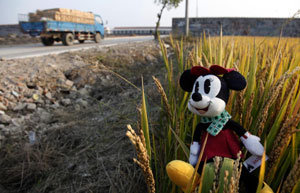Economy
Pedaling the green dream an uphill slog in Beijing
(Xinhua)
Updated: 2010-11-20 11:00
 |
Large Medium Small |
BEIJING - Wang Yong is one of the few struggling to sustain a bicycle rental business in Beijing, where the roads are increasingly ruled by cars.
But he doubts he can see his business return to the good times of the 2008 Beijing Olympics.
"After 2008, the need for public bicycles shrank quickly. So we closed some rental outlets. In just a year, the number of rental shops fell from 100 to 20. More than 5,000 bicycles have been stored in our underground garage," says the director of the Lantu Suobei Car Rental Company.
In one of the company's best outlets near the Beijing Hotel along the busy Chang'an Avenue, only seven or eight bikes, fewer than a fifth of its total, are leased each day.
"We have to cover most of the bikes with tarpaulins," says the bicycle keeper, a middle-aged woman surnamed Bai.
Wang admits the business has been in the red since it was established almost five years ago.
"Keeping these vehicles costs us 80,000 yuan ($11,940) to 100,000 yuan for each outlet every year. I've invested more than 50 million yuan in this project. If we take it as a business, we will soon be beggars. We are hoping for government support to survive," says Wang.
Earlier this month, Fangzhou Bicycle-Lending Co, a major bike rental company in Beijing, declared bankruptcy, closing hundreds of shops and liquidating thousands of bicycles for up to 50 yuan each.
Established in August 2008, Fangzhou once had 1,000 bikes at more than 200 lending outlets across the capital.
At one of its rental outlets near Caishikou subway station, a woman keeper of a bicycle park said she bought one from the company. With a rusty brake, cracked saddle, and stains from a vitamin ad on its front basket, the bike mirrored a failing business.
Fangzhou Bicycle-Lending used to sell advertising on the bicycles, but the ad income was low as it could not attract big-name customers.
Executives of Fangzhou Bicycle-Lending were not available to comment.
However, Wang Yong believes the fate of Fangzhou can be avoided if the government offers the necessary incentives, because encouraging bicycles is in the public interest.
He says rentals boomed in 2007, a year before Beijing Olympic Games, when the local government decided to promote public bicycles.
Almost overnight, rental outlets spread throughout Beijing, in many major business districts and communities, especially around subway stations, hotels, office buildings, and transportation hubs. At its peak, Lantu Suobei had 100 outlets, offering 8,000 bikes in total and employing 300 people.
As the rents are far from enough to cover the costs, business operators are feeling squeezed.
As the high-sounding "low-carbon ride" fails to sell, Wang says many people are inclined to drive their own cars rather than ride a bicycle, although they suffer frequent gridlock.
"Beijing is a super large city. I won't ride a bicycle if I am going to a place far away. It's not realistic," says local Shi Xiaoxin. "It's not convenient for people who are used to the rush of city life. As bike rental outlets are not close to each other, I have to ride farther to find another shop to return the bike. It's a lot of hassle."
According to the Beijing Municipal Commission of Transport, the number of people using public transport has risen in recent years. But the proportion of cyclists has declined to 20 percent from 30 percent five years ago.
A separate development plan released by the commission on its official website in August encouraged residents to travel "green" for the next five years.
| |||||||
When asked to comment on the plan, an officer with the commission declined to be identified. "We can only give suggestions to government planners on public transportation. Only the Beijing Municipal Government has the authority to provide real investment to fulfill the plan," he said.
Wang Yong believes the government should figure out a way to support the business in the public interest as emissions of automobiles have become a major pollutant.
"I hope the government can provide necessary support, such as larger areas for parking and wider roads for cyclists, but not for car drivers," he says.
"If bicycle rentals cannot survive on a large scale in this big city, I will keep at least one bicycle rental outlet in Beijing just because it has been a part of Chinese life since my father was a child."
 US companies still want to do business
US companies still want to do business

